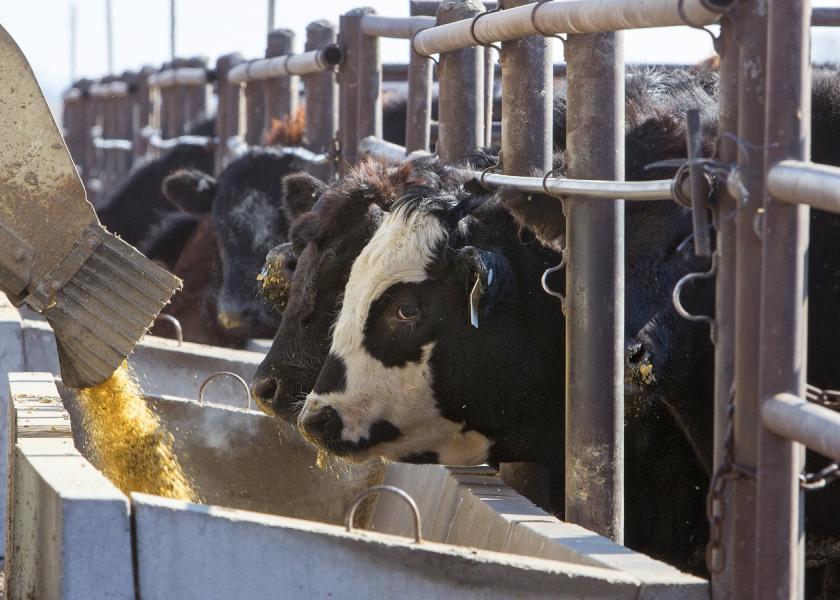Cowboys React To Revised Cattle Price Discovery Bill

On Monday four Senators announced they have revised their proposal that would reform the nation’s cattle markets. The updated legislation, called the Cattle Price Discovery and Transparency Act of 2022, drew comments from a wide range of industry stakeholders with varying degrees of support and opposition.
Among the three prominent cattle producer groups, U.S. Cattlemen’s Association supports the bill, the National Cattlemen’s Beef Association (NCBA) opposes, and R-CALF USA is undecided.
The revised bill would establish 5-7 regions in the U.S. where minimum levels of fed cattle purchases must be made through “approved pricing mechanisms.” Violations of the regulation would result in a maximum penalty of $90,000 for packers that have slaughtered 5% or more of the nation’s harvest over the past five years. The bill would also create a publicly available library of marketing contracts.
The four Senators introducing the bill are: Deb Fischer (R-Neb.), Chuck Grassley (R-Iowa), Jon Tester (D-Mont.), and Ron Wyden (D-Ore.). The senators first introduced the bill in November.
Statements from stakeholders:
U.S. Cattlemen’s Association (USCA) president Brooke Miller says there is “momentum for industry change.” In a statement, Miller said USCA supports “mandatory cash trade minimums,” a concept he says is supported by a majority of the Senate Agriculture Committee.
National Farmers Union (NFU) president Rob Larew says “rampant consolidation in the cattle industry has made pricing in the cattle market increasingly opaque. Fair and competitive markets rely on price discovery and transparency. For farmers and ranchers to bargain effectively with packers, they need access to reliable, accurate pricing information. This bill would shed light on the market and bring about greater fairness.”
Support for the bill from Senator Fischer’s home state came from both the Nebraska Farm Bureau and the Nebraska Famer Union.
“NEFB remains committed to working with Senator Fischer to provide additional cattle market transparency and price discovery,” said Nebraska Farm Bureau President Mark McHargue.
“Nebraska Farmers Union (NeFU) strongly supports” the revised bill, says NeFU president John Hansen. “This negotiated bipartisan bill represents an historic opportunity to substantially improve and reform beef markets. It will increase beef market competition, transparency, the volume of mandatory price reporting data, cash market sales, penalties for packer violations, and establishes a cattle contract library.” He said the current system “is systematically squeezing multi-generational” ranchers out of business.
From the Nebraska Cattlemen, president Brenda Masek said, “Until price discovery participation is better valued at all points in the supply chain, live cattle market price negotiation will continue to decrease until there is little to no negotiated trade left and outside markets will have to be relied upon for price determination.”
Opposing the legislation, NCBA Vice President of Government Affairs Ethan Lane issued the following:
“Despite overwhelming feedback in opposition to a cash mandate, this latest version of the Fischer/Grassley bill expands the concept to ensure that every single producer in the country selling fat cattle would be subject to a business-altering government edict. This is an indication of just how far the sponsors of this bill have strayed from the wishes of the majority of cattle producers around the country. It is time for the sponsors to finally consider the perspectives of all those who this bill would impact, not just those in their own backyards – and we are ready to have that conversation whenever they are.”
In a statement from R-CALF USA, the group noted it was “strongly opposed to the initial version” of the bill and called for its rejection by the Senate Ag Committee.
Regarding the new revision, R-CALF USA CEO Bill Bullard said his group “remains deeply disappointed that Congress has not yet taken any meaningful action to address the serious crisis in the cattle industry that is now entering its eighth year.”
He said R-CALF fears many more ranchers and cattle feeders will leave the business without market reforms, and that the group has asked Congress to take “decisive action” in the past.
“While we reserve our opinion regarding the modified compromise bill pending our ongoing analysis, we remain concerned that at its heart, the proposal authorizes the USDA to take up to two more years before it even establishes minimum cash volume requirements; to set those minimum requirements at the same inappropriate level that they’ve been at during the past two years; and then to keep them at that inappropriate level following the required review after the first two years of implementation and periodic reviews after each five-year increment,” Bullard said.
“We were hoping Congress would provide a measured response to this serious crisis and we will continue wading through this complicated proposal to determine if it provides any meaningful reform worthy of America’s independent cattle producers’ support,” he concluded.
Related stories:
Cornett: The Mandaters Move On
Senators Revise Cattle Price Discovery and Transparency Act
Potts: Supply, Demand Balance Without Government Intervention
Cornett: A ‘Hard Cull’ On The Facts
Packers and Allies Urge Congress to Do Nothing in Face of Broken Markets
Speer: Policy Makers Should Just Leave Well Enough Alone
Speer: Is Fair What We Really Want?
Uhl: The quest to improve cattle markets
Speer: Business First, Market Second
Cornett: 'What Does the End of Beef Mean for Our Sense of Self?'
Cornett: Cattle Markets Could See ‘Techtonic Shifts’
Cornett: Insights From 'A Yankee' Feeder
Cornett: Stewardship and Sustainability Will Influence Price Discovery







